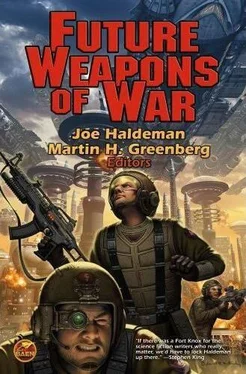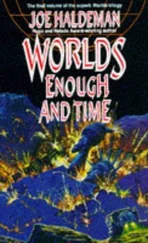“Would you like a sedative, Miss Loomis?” Gilfillan inquired. “It shouldn’t be a bumpy ride, but if you suffer from travel sickness…”
“No way,” Jenny retorted. “I’m keeping my wits about me as long as I can. I need to think about this situation—the upside, not the downside.”
Gilfillan looked at her quizzically. Jenny felt a perverse need to prove to him that she really was capable ofunderstanding anything he might care to tell her, in spite of being a mere accountant.
“The way I’m trying to see it,” she said, “is that the military application was just a way of getting the funding. With any luck, Junior’s utility as a strike force will be obsolete by the time he’s in secondary school. Selective contagion is no bloody use at all if everyone has defenses—the city walls will hold off the cannon every time; it’s the long sieges that do the damage. The spinoff from better disease carriers will be better immune systems. By the time my boy starts sowing his own seed, we’ll be looking forward to a generation fully-armored against all disease, accidental or deliberate.”
The doctor hesitated before rising to the bait, but he rose. “I wish it were that easy,” he said. “If I were in charge of the biowar to end all biowars I’d be a happy man. The peace dividend isn’t to be sneezed at—the probes we’re using as targeting aids will be a key phase in the pharmacogenomic revolution, but the trouble with biological engineering—even when it’s only tinkering with expression—is that you can never do just one thing. There’s always spinoff.”
Jenny knew that he was testing her, to find out how much she understood, and hoped that she was equal to the task. Genetic probes were what the NHS doctors used to do the routine Genetic Profile tests to which her baby had recently been subject. Searching out weaknesses with a view to treatment was only a short step away from searching out weaknesses with a view to convenient murder, which was presumably what he meant by “targeting.” As long as there were variations in the individual DNA of human beings—and how could the human race be reckoned healthy if there weren’t?—then sufficiently clever probes would always be able to identify ways of attacking some people while leaving others untouched, if not with hostile viruses then with tailored cancers and other innate catastrophes. Her boy, she supposed, was destined to carry an armory of probes as well as the strike forces that would pick out the targets whose vulnerabilities the probes had identified: individual targets, in some instances, but more often families, and whole related populations.
All wars, Jenny knew, were matters of economics—and ever since the oil supply had peaked, moving history into an era of permanently dwindling resources, economics had become an anything-but-dismal science. She understood that, because she was a tax accountant. She knew, too, that since her son had no choice but to be born into such a world, he would be better off as a weapon than he would as a mere target. The world was still a thoroughly civilized place, in spite of all the seemingly random biological attacks that always spread far more anxiety than the actual casualty figures warranted; the price of maintaining as much of that civilization as possible for as long as possible was a price worth paying, even if it included the child she’d set out to procure in a race against the biological clock. She had no problem with that.
But Gilfillan had mentioned spinoff…
“Where did it go wrong?” Jenny asked, as the ambulance sped towards its unknown destination.
“Why do you only have a platoon and not a battalion? It’s because the fetuses are so big, isn’t it? There’s a nasty side effect you hadn’t thought of.”
Again he hesitated, but eventually he nodded.
“We couldn’t do it by transplanting genes,” he said. “Transforming sperm isn’t that hard, but the new genes have to pair up within the zygote if they’re to stand a reasonable chance of expression, and transforming ova is a very different matter. We had to work with the genes that were already in place, working on the expression process itself. Natural carriers aren’t so very rare, and they’re not exotic mutants. It’s just that their genes work differently—I would say better, but there are costs. Any tinkering with the expression process reduces the probability that a sperm will implant, so we expected the in vitro program to fail, and that a lot of the embryos conceived in the ordinary way would fail within the first trimester, but we hadn’t expected the kind of problems that developed thereafter. Your chances of carrying Graham Lunsford’s child to this point in the pregnancy were probably more remote than winning the jackpot on the National Lottery.”
Jenny was ashamed that first thought was regret that she hadn’t miscarried and saved herself the bother. She tried to concentrate on the intellectual labor and the search for the fugitive upside, but she needed help. “Why?” she asked, trying to sound forceful. “Why do they grow so big? Why are they so bloody demanding?”
“It’s a matter of imprinting,” he said, having set aside his hesitations. “Do you know what that is?”
She had to shake her head.
“Some genes,” he told her, “are only expressed in a developing fetus if they come from the father’s sperm, whereas others are expressed only if they’re already present in the egg. Every pregnant woman is engaged in a struggle for resources with her own offspring. Every pregnancy is a battlefield, in which the best interests of the child are served by ruthless parasitism, and those of the mother by the preservation of reserves to serve the potential needs of future children. So, paternally imprinted genes work to assist the fetus in seizing more resources, while maternally-imprinted ones work to make the fetus’s demands more discreet. Over the course of our evolution, natural selection has produced a balanced situation, but we had to unbalance it to get the result we needed. Producing the perfect carrier necessitated favoring certain paternally imprinted genes—but we couldn’t just favor the ones we wanted. We had to tip the whole balance… with the results you’ve been experiencing. Fortunately, medical science has given us the means to deliver the baby successfully, so we can get a result that natural selection could never have favored.”
Jenny had to be quiet then, not only because she needed time to mull over what she’d been told, but also because she was too exhausted to talk—and because the soldier boy in her belly was already practicing his drill.
* * * *
When the orderlies brought her out of the ambulance on a stretcher Jenny craned her neck to see where she was, and was glad to observe that it seem to be a perfectly ordinary hospital, not a barbed-wire-surrounded camp. The conditions inside were far from Spartan; there was a TV in her tastefully furnished room. When she asked, Gilfillan told her where she was. He advised her against visitors, but assured her that it was perfectly okay for her to use her phone in spite of the equipment.
For once, Jackie answered before the “Ride of the Valkyries” had progressed through half a dozen bars. When Jenny told her where she was, Jackie seemed impressed. “I nearly went there to have my face lifted,” she said. “You could get yours done while you’re in. Two birds one stone, and all that rot.”
“I’m probably in a special wing,” Jenny said. “Only under observation, for now. They’ll leave it as long as possible to do the Caesarean, but I’m guessing tomorrow, if not tonight. I’ve told them you’re my official birthing partner, and they said that was okay, but you’ll probably have to sign the Official Secrets Act. If I start babbling uncontrollably, you might have to join up yourself.”
Читать дальше












